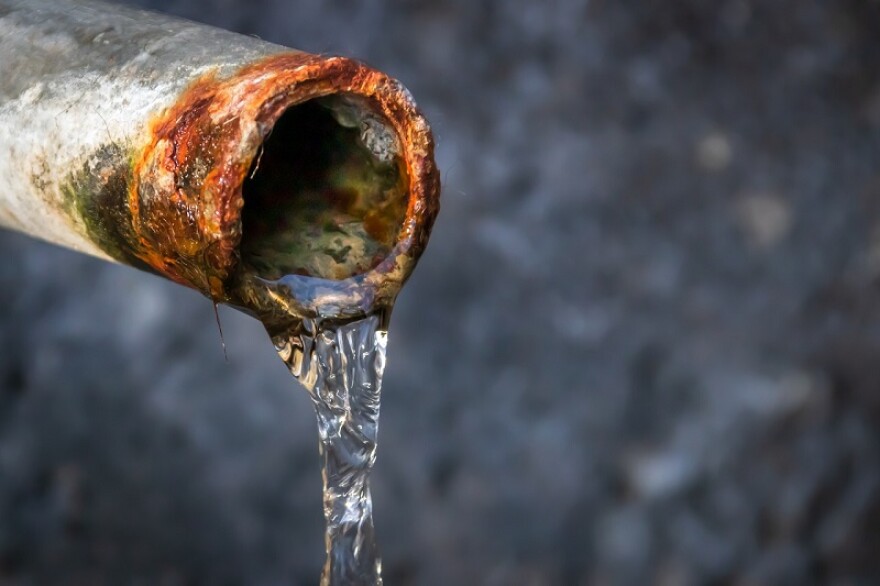Earlier this year WEKU investigated how aging water infrastructure is causing problems for residents of eastern Kentucky. In the second part of our series on water, city and county officials talk about how these problems impact their communities and what it is like trying to get help from even higher up.
Water is something we all use, for cooking, cleaning, even entertainment. That water has to come from somewhere, and in rural eastern Kentucky, water can be supplied from aging pipe systems that have been falling apart for some time.
“Most of the older systems, they still have pipe that is 70 to 100 years old in the ground, like old cast iron pipe and it's just worn out.”
Joe Burns is the Director of Programs and Operations for Kentucky Rural Water Association. We met earlier this year to discuss how the commonwealth's water infrastructure impacts local residents. He said replacing those pipe systems is not a cheap process.
“Try to make that pipe last as long as you can, because when you look at the prospect of replacing it, and you see where all the buildings are, all the black top, the sidewalks, the cost to replace all of that is incredible.”
Floyd County Judge Executive Robbie Williams. He said leaders at all levels should have been paying more attention.
“Water infrastructure, there has not been a priority put on it in 30 years, and I guess we're all to blame, we dropped the ball. I guess I'm just as to blame as anyone, I've only been in office for 5 years, but as a resident we should have demanded more from our public leaders, and we should have asked, what is the long term plan here, is this a sustainable plan? It was just, what was the issue of the day, let's deal with that issue.”
The problem goes beyond just getting water to the residents of his county. Kentucky recently received high marks for site selection and industrial projects.
Industry publication Site Selection magazine, placed the commonwealth at Number 2 in the South Central region of its 2024 Prosperity Cup rankings. Kentucky also placed Number 8 nationally.
“It's difficult to attract industry to an area where you don't have reliable a reliable water source, or sewer. Folks want those utilities on site and ready to go,” Williams said.
He added that has been one of his priorities since taking office.
“Get that footprint, that base, in place for these industrial sites and ensure that we have the utilities ready to go, we have those industrial sites that are ready to go, in order to attract new businesses to Floyd County.”
Those new businesses and industries could help people stay in the area. Williams said people started leaving as coal mining started to decline, and that deprives municipalities of revenue from their tax base to fix many of these problems they are facing. He said, that, coupled with natural disasters makes things difficult.
“It's just a perfect storm, it seems like that has hit us in the last five years. We've had 4,5,6 floods, just different events that have really hurt us financially. It's really impacted our revenue.”
Beattyville, in Lee County, has also seen natural disasters wreak havoc on its infrastructure. Mayor Scott Jackson said some of their holding tanks were damaged in a flood.
“We're working with the state to get more money in to do more with our tanks, rehab, and we're getting ready to start phase 2 now.”
Last month, the city received nearly $1.3 million dollars to rehabilitate three water storage tanks. This will provide cleaner water to more than 2,900 households. This federal funding comes through the Appalachian Regional Commission via Kentucky’s Department for Local Government.
It's something Robbie Williams and other community leaders, like Jackson in eastern Kentucky can do alone. Williams said networking with higher levels of government is necessary to deal with problems like this.
“You gotta get into your car and get to Frankfort, I mean there's folks that want to see me in this office 8-10 hours a day, sitting behind a desk, but you're not successful in this position sitting behind this desk 8-10 hours a day, you're successful in this position when you're in Frankfort and you're talking to folks.”
Jackson said he feels the people of eastern Kentucky are being seen and heard in the capitol.
“Lot of people when they think they need something, going to Frankfort is a big deal, but I tell you whtat, I have been mostly appreciated by Governor Beshear, our state representative and they understand our needs.”
Williams said he understands that there is only so much leaders in Frankfort can do.
“I truly think they want to help. They understand there is a limited amount of funding, and there are 120 counties throughout the state, so we can't fix everything at once.”
Jackson said his community has had a pretty good run so far.
“It's a process you have to go through, it's a vetting process, but the more you know of what you need, and how much you need before you go knocking on their door.”
Leaders like Jackson and Williams know fixing eastern Kentucky's water problems are going to take time and money. They are continuing to work with state and federal leaders to get the funds they need to be able to bring clean, usable water to their residents, and to hopefully be able to set up sites to bring more businesses, providing jobs, and revenue for the communities.
** WEKU is working hard to be a leading source for public service, and fact-based journalism. Monthly supporters are the top funding source for this growing nonprofit news organization. Please join others in your community who support WEKU by making your donation.








